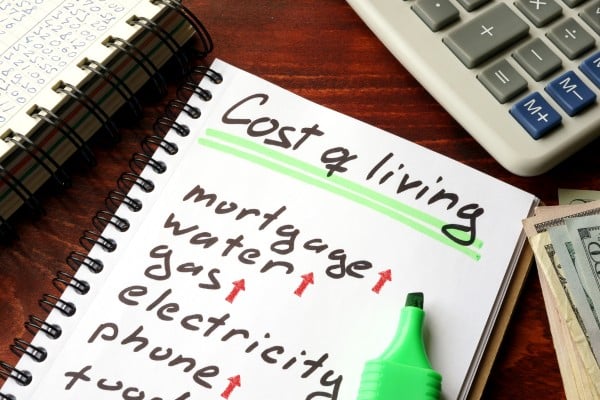
09 Oct Trying To Balance Living Costs And Debts? Top Financial Tips
Around the world and here in New Zealand, the cost of goods and services, such as fuel, groceries and utilities, has continued to rise, making it increasingly harder for families and individuals to manage living costs and juggle existing debt. But with careful planning and a few smart financial strategies, it’s possible to navigate the complexities of inflation.
How inflation impacts the cost of living
Inflation is a measure of how much the price of goods and services has increased over a period of time. An inflation rate of 7 per cent, for example, means that on average a typical household grocery shop for essentials or filling up the car with fuel costs 7 per cent more than the previous 12 months. A higher inflation rate means each dollar buys fewer goods and services.
Kiwis who are battling a higher cost of living, will be feeling the pinch across food, housing, and transport. Government and the Reserve Bank are working hard to reduce inflation with a number of cost-cutting strategies and interest rate hikes designed to slow spending.
Inflation can be felt most in common day to day expenses like:
- Fuel Prices: As the cost of crude oil rises due to global factors such as changes in oil supply, fuel prices at the pump increase too. This can cause a knock-on effect in the transportation sector, which leads to higher delivery costs further contributing to the rising prices of goods.
- Groceries: Inflation affects the agricultural sector too, with the increased costs of raw materials, transportation, and distribution being passed on to the consumer, resulting in higher prices at the supermarket till for groceries and essentials.
- Utilities: The production and distribution of utilities such as electricity and water require significant resources and infrastructure. When these costs increase, utility providers often adjust their rates, leaving consumers with higher utility bills.
Strategies for coping with a rising cost of living
Rising inflation is an obvious concern for households managing finances, as it erodes spending power and savings and makes it harder for families and individuals to maintain living standards when incomes simply don’t stretch far enough. To help cope with the rising cost of living, here are our top tips:
- Create a budget: Start by analysing monthly income and expenses in a budget and categorise spending to identify areas that could be cut back. Sticking to a budget will help you prioritise essential expenses and minimise discretionary spending.
- Build in an emergency fund: Set aside some money to be used for emergencies, a safety net during unforeseen circumstances such as a medical emergency or a sudden job loss. However, we all know that life can be unpredictable, and emergencies don’t always wait for us to be fully prepared. If the unexpected does happen, remember that help is still available. At Max Loans, we genuinely understand the stress that unexpected situations can bring, and we are here to assist with emergency loans across New Zealand, ensuring you can swiftly access cash when you need it most. An emergency loan through Max Loans can be used for a range of things, such as house & car repairs, medical expenses, bond and moving costs, vet bills, and funeral costs, helping you manage unexpected costs and making navigating tough situations a bit smoother.
- Cut down on debt: Using repayment strategies in combination with debt consolidation loans will help you take back control of your debts and could potentially help you clear your debts faster. If you have high-interest debts, the snowball method might be an effective repayment strategy for you.
- Focus on energy efficiency: Find ways to reduce energy usage in the home as that will have a positive impact on monthly utility bills. Switch to LED lightbulbs, replace outdated appliances with energy-efficient ones, turn off lights and appliances when not in use, and check that your home is properly insulated to reduce loss of heat. If you are eager to improve your home’s energy efficiency but find yourself short on funds for that renovation project, our Personal Lending Advisers at Max Loans can assist with a home improvement loan to help kick-start your project without delay. Alternatively, if you’re looking to increase the size of your home loan to finance your renovation plans, our experienced Mortgage Advisers at Max Mortgages can help you navigate the process of expanding your home loan to bring your renovation dreams to life. Most banks are currently offering home loan top-ups to help you make your home energy-efficient while encouraging the usage of sustainable energy solutions. You could also look at options of purchasing an EV or a PHEV with the help of these home loan top-ups. The pricing offers are great which not only helps reduce associated costs but also helps save the environment. Get in touch with our expert Mortgage Advisers for a discussion on these home loan top-up products.
- Shop around and compare: Use comparison websites to check and compare the price of power, gas, phone and internet, and switch to another provider if viable.
- Explore alternative transport options: Consider car-pooling, using public transport, or biking to work when feasible. Not only will it save you money, but it also reduces your carbon footprint.
- Shop smarter: When shopping, look for discounts and special offers, use coupons, buy in bulk, or switch to home brands to save on groceries and other essentials. Compare prices and manage your grocery spending by shopping online.
- Review insurance policies: Go over existing insurance policies with an Insurance Adviser to find ways to save on general insurance while ensuring you still have the right amount of cover.
- Don’t miss repayments: Bad credit can impact your future financial situation and make it harder to secure NZ Loans. If you have a low credit score or credit defaults due to missed payments, find out how bad credit loans can help you pay for the things you need while improving your credit score.
Finding financial solutions
Understanding the causes of rising prices and implementing a few smart financial strategies can help households cope with a higher cost of living while managing debts responsibly. It’s important to seek help early on if you foresee financial trouble ahead, because the earlier you do so, the more opportunity there is to find a financial solution.
If you anticipate financial difficulties ahead, contact a Max Loans Personal Lending Adviser and take back control of your financial situation with expert advice on personal loans NZ wide.
Apply Now
Find this article helpful? Don’t forget to like it or share it on Facebook.


